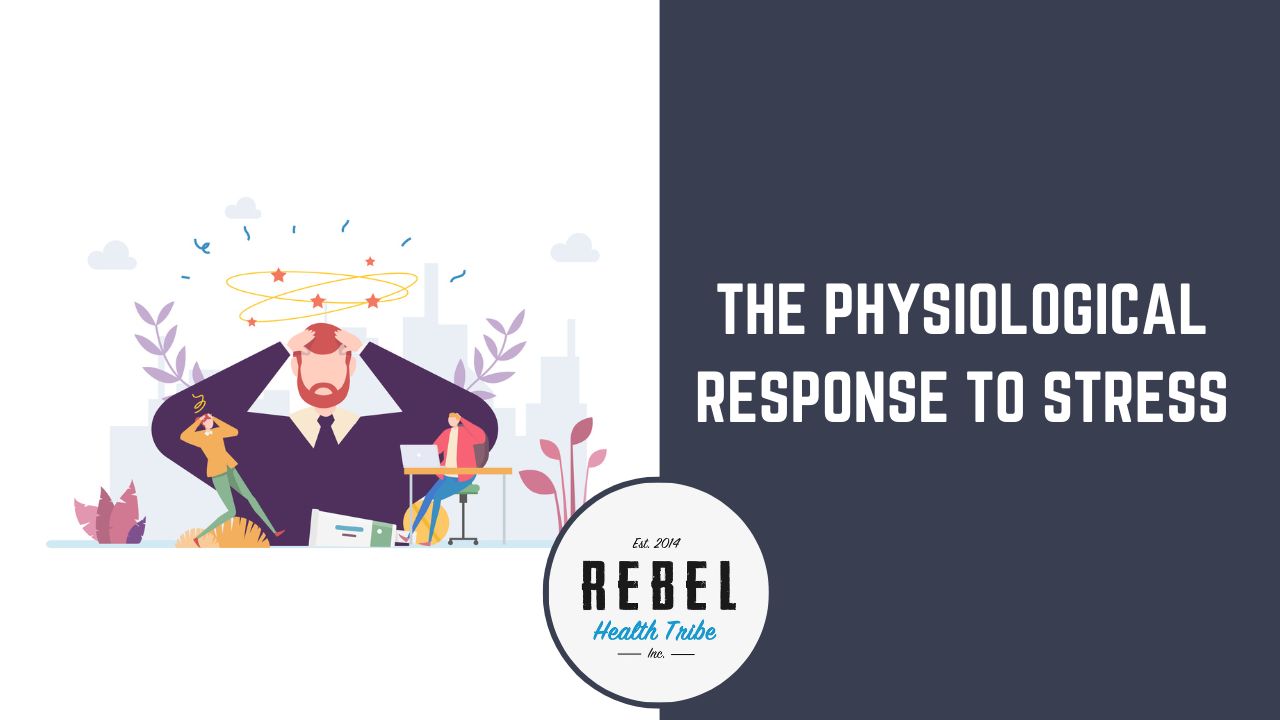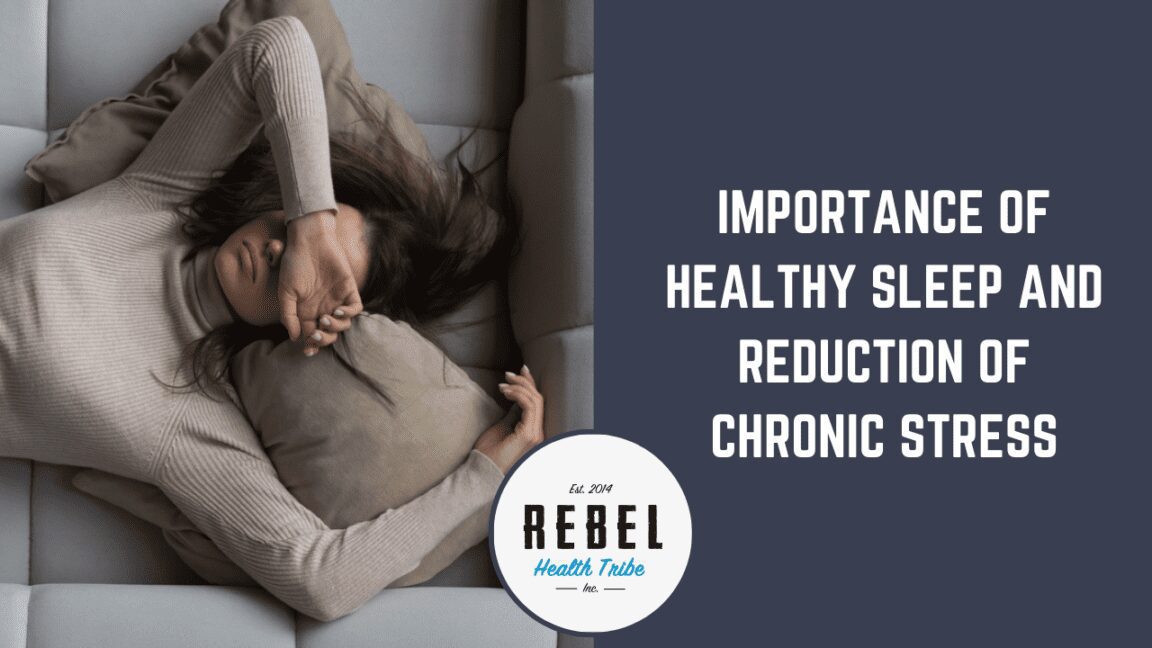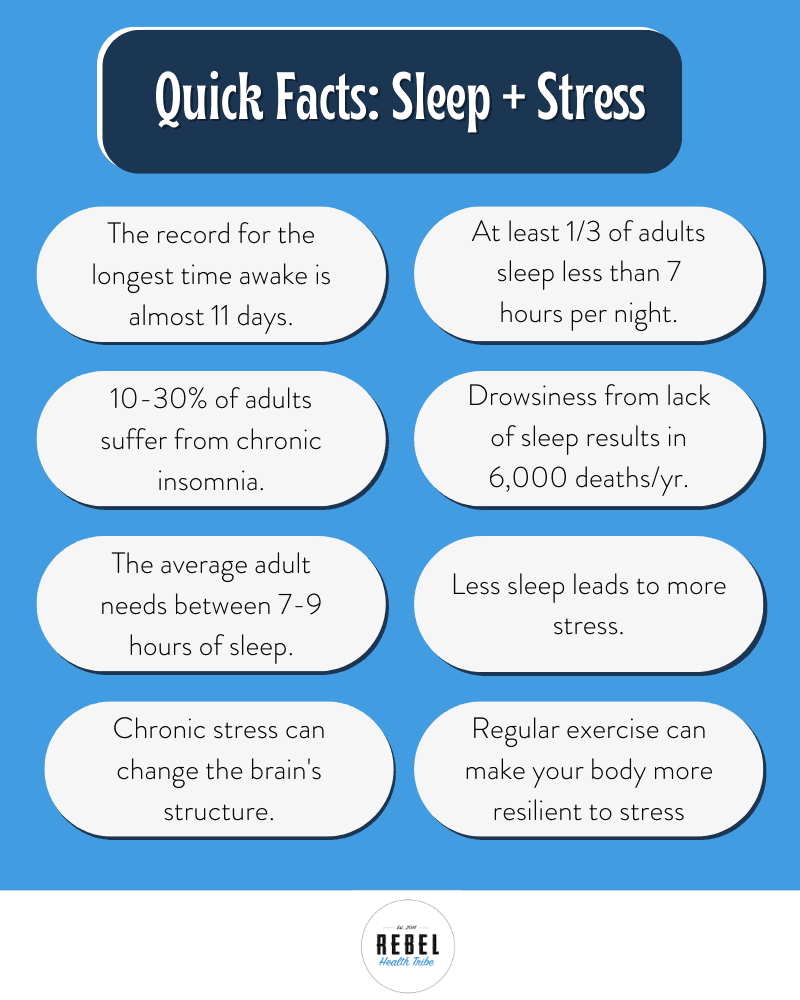
The Physiological Response to Stress
The Physiological Response to Stress Stress is a universal human


The Physiological Response to Stress Stress is a universal human

What Are Adaptogens and How Can They Help? When it

Importance of Healthy Sleep and Reduction of Chronic Stress Most
Most of us are well aware of the importance of diet and exercise for good health. For years, it has been drilled into us that to feel our best, we should eat the right kinds of foods (and less of the bad ones) and get regular exercise to keep us strong and trim.
Unfortunately, much less attention has been paid to the importance of healthy sleep and stress management. Perhaps it is because addressing sleep and stress would require some of us to make significant adjustments to our lifestyles. But, for whatever reason, these two health markers are often ignored.
A closer look at sleep and stress reveals how integral these two habits are to every single other aspect of our health. You can eat a good diet, exercise regularly, take all the right supplements, and still not feel your best.
If you’re stressed and not sleeping well, everything else suffers. No amount of healthy food or movement can erase the effects of stress and sleep deprivation on your body.
Unmanaged, chronic stress is one of the main drivers of many widespread chronic diseases. Add to that the disruption caused by lack of sufficient or quality sleep, sometimes caused or exacerbated by stress, and you have the perfect storm. Your body requires adequate relaxation, rest, and sleep for optimal health.
To be truly well, creating habits that protect and improve your sleep and stress level is non-negotiable. Let’s take a closer look at:
Have you ever wondered what happens while you sleep? When you pause to think about it, sleep is a rather interesting state in which your body continues to function without your conscious awareness. Yet, we cannot survive without spending a significant chunk of time asleep.
Without sleep, your body would soon begin to fail. The record for the longest time awake is almost 11 days. However, managing to stay awake is different from functioning well. All studies that have examined the effects of sleep deprivation demonstrate significant side effects from going without sleep.
Even if we force ourselves to stay awake, the physical effects rapidly take a toll.
The modern era may be the most sleepless in human history. Many modern cultures seem to glorify not sleeping. The people we look up to or identify as successful are often those we perceive as being the hardest workers, no matter the cost. The message we hear is that those who get up early and work long into the night are the ones living their dreams.
Sleep is for slackers, or so we might think based on the many mixed messages around us.
Now, we must acknowledge the reality that for some people in today’s society, it is, unfortunately, necessary to work long hours, leaving little time for rest and sleep. But for many others, sleep deprivation is a choice made out of poor habits. In the end, our physiology doesn’t care about the reason. Lack of sleep destroys our health.
At least a third of adults sleep less than 7 hours per night, and that number varies based on factors such as
Half of all adults report feeling sleepy during the day, and between 10-30% of adults suffer from chronic insomnia. Drowsiness from lack of sleep increases the risk of accidents at work and is responsible for as many as 6000 traffic fatalities each year.
Sleep deprivation occurs when you fail to allow enough time for sleep. The average adult needs between 7 to 9 hours of sleep each night. Less than that is insufficient for the body to carry out the essential rest and repair functions that take place during that critical time.
“Long-term sleep deprivation does much more than impact your day-to-day functioning. Every body system depends on those 7-9 hours of sleep to work effectively. Lack of sleep gradually degrades these body systems as they fail to get time to rest, repair, and recalibrate each night.”
Sleep deprivation can be acute or chronic. If you’ve ever had a random bad night of sleep, you know what acute sleep deprivation feels like. You may feel zombie-like, struggle to focus, and have difficulty managing your mood.
Chronic sleep deprivation refers to failing to get adequate sleep for three months or more. Adults who regularly get less than 7 hours of sleep are in a chronically sleep-deprived state, and it may be such a normal part of their lifestyle they don’t even think about it. Symptoms of chronic sleep deprivation include:
Long-term sleep deprivation does much more than impact your day-to-day functioning. Every body system depends on those 7-9 hours of sleep to work effectively. Lack of sleep gradually degrades these body systems as they fail to get time to rest, repair, and recalibrate each night.
Many health conditions are linked to chronic sleep deprivation, including:
In comparison to chronic sleep deprivation, where a person fails to prioritize or simply doesn’t have enough time to sleep, insomnia is a sleep disorder in which a person cannot fall asleep despite having time to do so. While some of the information in this article may be helpful, a sleep disorder should be diagnosed and treated by a medical professional.
We can’t talk about sleep without touching on REM sleep. REM stands for rapid eye movement and is a unique stage of sleep during which your eyes move rapidly behind closed eyelids and your brain is more active than at other times of your sleep cycle.
While all stages of sleep are important, REM sleep is of particular importance. During REM sleep you process emotions, dream, consolidate memories, and repair and grow brain cells. Lack of sufficient REM sleep results in sleep deprivation.
If you’re a restless sleeper who wakes often and isn’t able to sink in each part of your sleep cycle, you will likely feel exhausted even after a full eight hours. It’s a prime example of why you need enough sleep, but also quality sleep.
Sleep is a hardwired part of what it means to be human. In part, this is due to our connection to the natural world and how it determines our circadian rhythm.
Your circadian rhythm is, at its most basic, your sleep/wake cycle over the course of 24 hours.
Like all life on earth, our bodies respond to the environment. The rising of the sun signals specific hormones to circulate, promoting alertness and activity. The setting of the sun and ensuing darkness also influence hormones and signal it is time to wind down and sleep. In addition, many other factors such as temperature, metabolism, age, and habits all determine your circadian rhythm.
Looking at a clock face, a healthy circadian rhythm might look something like this:
6 am: Morning sunlight triggers cells in the brain to promote alertness. The hormone cortisol increases at this time of day, leading to a state of awareness and energy. Body temperature and metabolism gradually increase.
12 pm: For most people, wakefulness and alertness increase and peak during the morning hours. Metabolism and heart rate are at it’s highest around midday.
6 pm: As daylight wanes, cortisol levels decline, and melatonin levels increase, promoting drowsiness towards the end of the day. Body temperature and metabolism dip. For most adults, melatonin rises beginning in the evening and peaking by 10 pm. This is likely the optimal time to go to bed.
12 am: Overnight, melatonin levels gradually begin to decrease as cortisol begins to increase in anticipation of morning.
This is, of course, a very simplified version of what is a truly complex circadian rhythm.
Effects of Light and Sunlight on Mood and Sleep

While modern life has allowed us to disconnect to a certain degree from the constraints of the hours of available sunlight, it has not all been to our benefit.
Your circadian rhythm regulates many essential body processes. When we move too far outside our inborn rhythm, our health suffers.
Many habits or environmental factors can disrupt normal circadian rhythm. These include:
Essentially, anything that interferes with your normal routine can throw a wrench in the system. And the less natural light you expose yourself to during daytime hours, the more out of sync you become. While the human body is amazingly adaptable, chronic circadian rhythm disruptions eventually degrade health.
Because every body system is directly or indirectly regulated by circadian rhythm, disruptions interfere with normal body function. The effects can be wide-ranging and devastating.
It’s easy to believe that because our world has advanced technologically, we no longer need to be tied to the 24-hour day. But, in truth, our health is inescapably linked to the rhythms of the natural world. Sunlight is as essential to our well-being as good food and movement.
Morning sunlight has a powerful effect on energy and mood.
One of the most common examples of circadian rhythm disruption is the high incidence of seasonal affective disorder (SAD) during winter. Upwards of 10% of the population in the northern latitudes of North America experience depression linked to the changing seasons. In southern latitudes, the incidence is as low as 1.4%.
Sunlight makes all the difference.
Lack of morning sunlight coupled with shortened daylight hours is a significant circadian rhythm disruptor. Without the signals from sunlight, hormone levels are disrupted, and mood is impacted. Energy and motivation often decline, and depression sets in.
SAD is a form of depression that occurs seasonally, usually in the fall and winter, as sunlight wanes. It would be much more common in northern latitudes than those closer to the equator, where sunlight is consistent year-round.
Light therapy is one of the most effective treatments for SAD. It is a powerful example of how essential sunlight is to our well-being.

We can’t talk about sleep without talking about chronic stress. The two are intricately linked and have a significant influence on each other. Stress interferes with normal, healthy sleep. And conversely, lack of sleep exacerbates and even causes stress.
Stress refers to a state of tension when your body reacts to a challenge. Whether you’re running a marathon or being yelled at by your boss, stress is the feeling of emotional or physical tension you may experience.
To handle stress, your body comes equipped with what is called the “fight or flight response.” When presented with a challenge or threat, your body releases a surge of hormones to prepare you to confront any perceived danger.
Depending on the threat, your body is primed to stand and fight or run away. This is a useful adaptation developed from our primitive need to tackle the challenges of the natural world.
However, your fight or flight response is designed for acute stress situations. If you encounter a bear, you run from the bear. Once you are out of danger, your stress response naturally subsides, and you recover from the experience.
In modern culture, we rarely face physical dangers. But, our body responds to pretty much all stress in the same way. So, what happens when stressors are chronic?
Imagine this: you have a job with a boss who makes things very difficult. You deal with stressful situations that evoke a fight or flight response multiple times a day. Since the problem is never-ending, the stress response never subsides. Instead, you are chronically experiencing the physiological equivalent of running from a bear all day long.
Your body is not designed for this level of ongoing stress. Eventually, you become depleted.
Just like modern culture celebrates people who work non-stop and skimp on sleep, many of today’s societies have normalized lives full of stress. Everywhere you look, people are overstressed, overworked, and under-rested.
As many as 55% of adults in the US experience regular psychological stress. And one in five deal with a mental illness. The effects of such pervasive stress are trickling down to impact children, with rates of anxiety and depression skyrocketing among kids and teens.
The statistics are clear on the interrelationship between stress and sleep. Adults who sleep fewer than 8 hours each night are more likely to experience high levels of psychological stress, irritability, and mood changes. And individuals with high levels of stress experience significantly more trouble getting a good night’s sleep.
Stress can come in many forms. Some of the most common are:
But stress can also be subtle. Some things we take for granted can also be a source of ongoing psychological stress. Some lesser-known causes include:
“You can’t eliminate stress entirely, and that’s ok. But, you have to do things that help your body complete the stress cycle instead of remaining stuck in fight or flight mode.”
Stress is not all bad. It plays an important role in making you alert and responsive, which can be helpful in certain situations. For example, if you get on stage for a big presentation, your body’s stress response provides a surge of adrenaline that sharpens your focus and gives you the energy to rise to the occasion.
But, while stress can be helpful in certain acute situations, chronic stress is pretty much all bad news. Constant exposure to stress hormones, elevated heart rate, high blood pressure, and overall tension take a toll on your health.
Some common symptoms of psychological stress include:
Uncontrolled chronic stress leads to damage in almost every organ and tissue of the body. Let’s highlight just a few.
Brain: Chronic stress can actually change the structure of the brain. By producing white matter and shrinking grey matter, the brain may be less able to store or retrieve memories. Communication between neurons may also be impaired. In addition, chronic stress predisposes the brain to more serious mental illnesses such as anxiety or depression.
Heart: Ongoing stress places a lot of strain on the cardiovascular system. Stress causes increased oxygen demands, elevated blood pressure, and high heart rate, putting extra work on the heart. High blood pressure may eventually lead to heart disease and a higher risk of heart attack and heart failure.
Immunity: The stress hormone cortisol negatively impacts immune system function. Long-term exposure to cortisol suppresses the production of essential immune cells, promotes inflammation, and blunts the immune response.
Hormones: Stress causes a surge in certain hormones, including glucocorticoids, catecholamines, prolactin, and growth hormone. Over time, high levels of these hormones lead to dysregulation of the endocrine system. Diabetes, menstrual irregularities in women, obesity, and thyroid disorders are potential outcomes.
Insufficient sleep and poor stress management create a recipe for disaster. For optimal health, reducing stress and sleeping well must be part of your daily habits. Here are some of the top things you can do to address sleep struggles and chronic stress.
To sleep well, you have to honor your body’s circadian rhythm. Due to the demands of our society, jobs, and life in general, we understand that not everyone can do this perfectly. But, your physiology doesn’t care about your circumstances. Any step in the right direction is worthwhile.
To lower psychological stress, you need to both reduce stressors when possible and create daily habits that manage unavoidable stress. You can’t eliminate stress entirely, and that’s ok. But, you have to do things that help your body complete the stress cycle instead of remaining stuck in fight or flight mode.

How you reduce stressors is unique to your situation. For some people, it looks like learning to say no to certain commitments to leave time for rest and connection. For others, it might involve changing jobs or moving to create a better life. There is no wrong answer, just steps taken with intention.
No matter their stressors, everyone can take steps to better manage how their body handles psychological stress. Here are some good options.
Adaptogens are a class of herbs that improve the body’s resistance to stress. Studies examining the effect of adaptogens have found they may:
There are many different types of adaptogens, but a few to consider include ashwagandha, Rhodiola, and cordyceps. Here are a few supplements we find helpful:
Adrenal Super Tonic (Cymbiotika) – Adaptogenic/adrenal support tonic
HPA Axis: Homeostasis (Gaia Professional) – A blend of herbs that offer adrenal support, including cordyceps mushroom and siberian rhodiola.
HPA Axis: Maintenance (Gaia Professional) – This supplement is for regular daily use and contains the adaptogens holy basil and siberian rhodiola
HPA Axis: Sleep Cycle (Gaia Professional) – Different people need stress support at different times of the day. For those who struggle to manage stress in the evening and often sleep poorly, a supplement that targets the link between stress and sleep may help.
ZenBiome COPE – While not technically an adaptogen, this supplement contains a probiotic that may support the function of the HPA axis and lower stress.
Even with improved sleep habits, some people still struggle to fall asleep or stay asleep. In these cases, an all-natural supplement may help.
Somnium nighttime GABA cream – GABA is essential for sleep regulation. It tells the brain to wind down at bedtime and promotes calm. A GABA supplement acts to enhance the signals to the brain readying it for sleep.
Melatonin (quicksilver liposomal) – (add link, I couldn’t find it in the store…) Research supports the use of melatonin supplements as a natural sleep aid. It works by promoting the normal rise of melatonin right before bed, signaling sleep.
ZenBiome Sleep – The L-Theanine found in this supplement has been shown to be helpful for sleep and stress. It is reported to promote alpha wave activity in the brain, which indicates a calm mental state.
Sleep and stress are linked health behaviors that unavoidably influence every other aspect of well-being. When stress, sleep, or both are out of balance, there is a ripple effect throughout your whole life.
We cannot thrive without sufficient sleep and relief from stress. There is no way to escape our body’s need for rest and relaxation. It is both essential and enjoyable to get a full night’s rest and feel calm and centered during the day.
There are many natural ways to improve both these aspects of health. Better lifestyle habits, sometimes supported with all-natural supplements, can set you on the road to the rest and relaxation your body needs.
With BeSerene IR, you’re always a moment away from calm....
Too many anxiety treatment options leave you numb and struggling...
Combine BeSerene Instant Relief and BeSerene Daily. Together, the two...
ZenBiome™ Sleep is formulated to help clients deal with occasional...
An Exclusive Course with 10 Years of Microbiome
If you’ve ever wanted all of Kiran’s best
The toxicity and Detoxification Masterclass covers a wide
19 Leading Experts Share Cutting-Edge Science, Effective Practices,
Autoimmune Masterclass brings together 17 of the world’s
MegaSporeBiotic is a probiotic blend of 5
Bacillus spores that have been shown to maintain healthy gu
t barrier and immune function.
With BeSerene IR, you’re always a moment away...
Too many anxiety treatment options leave you numb...
Combine BeSerene Instant Relief and BeSerene Daily. Together,...
ZenBiome™ Sleep is formulated to help clients deal...
An Exclusive Course with 10 Years of Microbiome Knowledge Build Your Resilient Gut: Microbiome & Beyond with Kiran Krishnan is the
If you’ve ever wanted all of Kiran’s best content in one place, here they are! These are the exact trainings
The toxicity and Detoxification Masterclass covers a wide array of topics with the following guests: 1. Lara Adler, Environmental Toxins
19 Leading Experts Share Cutting-Edge Science, Effective Practices, and Clinical Strategies to Optimize Brain & Nervous System Health in Kids